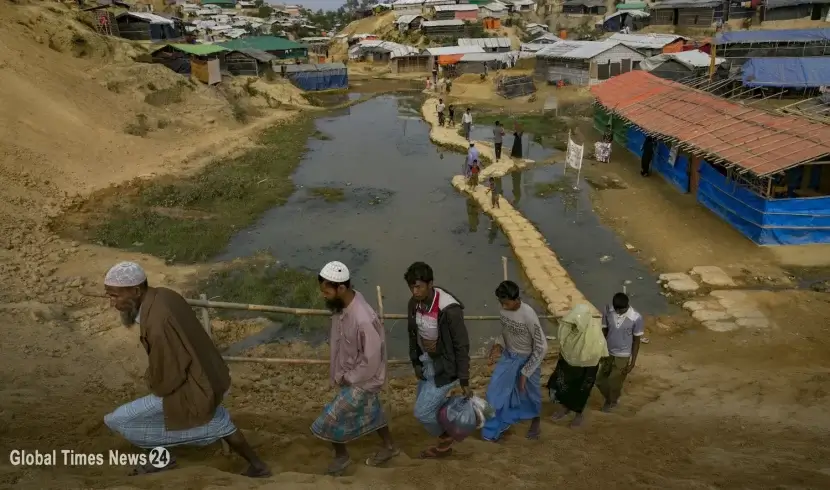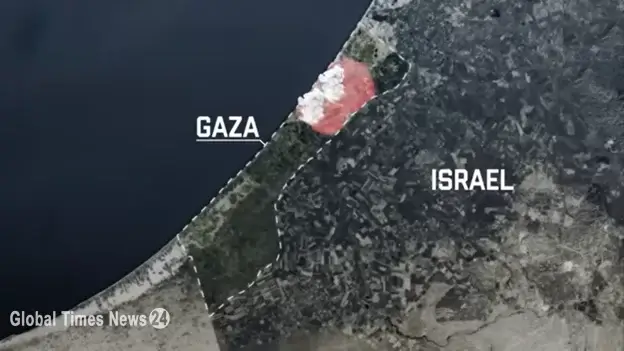Why the Israeli-Palestinian conflict is so hard to resolve?
Table of Contents (Show / Hide)

If you want to drive from Tel Aviv almost to the end of the West Bank it’s supposed to take you less than an hour and a half. But this pops up on the map: " This route may cross country borders." That makes sense: according to international law, this is a Palestinian territory. But Israel maintains the West Bank is “disputed” territory and often calls it Judea and Samaria, in reference to the region’s Jewish history. This tiny piece of land is home to possibly the most complex conflict in the world: The Israeli-Palestinian conflict. And it escalated further in early October 2023 when militants from the Palestinian group Hamas crossed into Israeli territory, killed people, took hostages. Israel reacted with massive airstrikes on Hamas, which also killed civilians and displaced hundreds of thousands more. And it's not only a regional conflict.
The whole world seems somehow involved. Your own government may be part of trying to negotiate a peace agreement. Part of your taxes may go to humanitarian aid in the region - or weapons. And – everyone seems to have an opinion on it. The conflict has a long history – of wars, of violence, oppression… and failed peace negotiations. That has left many people hopeless. And yes, with the Israeli-Palestinian conflict it’s hard to know where to start. We won’t have time to look into every detail – such as all the international players involved. That’s why we want to focus on the solutions that have been proposed over the years. And find out what the sticking points are.
Israel is the only majority-Jewish country in the world. It was established to offer Jewish people a safe haven in their historical homeland, which many saw as essential after Germany’s systematic murder of more than six million Jews in the Holocaust. Israel has a population of around 10 million. About a fifth of its citizens are Arabs of Palestinian origin. Then there are the Palestinian territories: More than 3 million Palestinians live in the West Bank. It has been under Israeli military occupation since 1967 and is partly governed by Fatah, a Palestinian political party. Then there’s the Gaza strip, which is controlled by the group Hamas. The entire population of Gaza has been living under blockade for more than 15 years, which rights groups say is illegal but Israel says is necessary for its safety. And there’s Jerusalem. But we’ll get to that in a bit because there’s really a lot to unpack.
Basically, the conflict is about land and who has the right to it. But how can this decades-long conflict be solved? The most talked about idea is a two-state solution: An Israeli state, and a Palestinian state – that would recognize each other and co-exist in peace. To dig deeper, we’ll take a short trip to the history of the two-state idea. In 1947 Britain wanted to end its control of the region. The UN proposed a Partition Plan which would have divided historic Palestine between Arabs and Jews. The Jews accepted it, the Arabs didn’t. Israel then declared its independence in 1948. And was attacked by a coalition of Arab nations.
Israel won and gained territory. During the war and the foundation of Israel, an estimated 750,000 Palestinians fled or were driven out of the new state. Palestinians remember this as the Nakba or "catastrophe." Israel and neighboring Arab nations who said they were supporting the Palestinians fought many more wars since then, changing the map multiple times. The first face-to-face peace agreements between Israel and the Palestinians came in the 1990s in what’s known as the Oslo Accords. This handshake kicked off years of intense negotiations over a possible two-state solution. Here’s Nimrod Rosler—he's the head of the International Program in Conflict Resolution and Mediation at the Tel Aviv University. That was the point of time where there was a peak for hope, for peace among both sides. And they got really close to a solution at Camp David in 2000, but ultimately didn’t make it. So, hang on a second. There was never a final peace treaty. Why?
Let’s take a look at some of the sticking points. Here’s the first one: Jerusalem. It’s a city sacred to the major monotheistic religions: to Jews, Christians and Muslims. Jews gather to pray here at the Western Wall, the only remains of their ancient temple, the holiest site in Judaism. For Muslims the very same site is considered the third holiest place in Islam because the Prophet Mohammed is said to have transcended to heaven from the spot where the Al Aqsa Mosque and the Dome of the Rock is situated now - known to Jews as the Temple Mount. And because this place is so holy to both Jews and Muslims, it’s a trigger for both sides and the scene of tensions and provocation. All that’s because the status of Jerusalem is so disputed. Israel occupied the Palestinian part of Jerusalem, East Jerusalem, during the 1967 war, ultimately annexing East Jerusalem in 1980.
Israel sees the whole of Jerusalem as its eternal, undivided capital. What does that mean in the present? Imagine you’re a Palestinian who was born in East Jerusalem. You might feel Palestinian but cannot have Palestinian documents. And you generally also don’t have Israeli citizenship which makes daily life difficult – for example, your residency status can be revoked which can eventually lead to the loss of health care and even the right to enter Jerusalem. We mentioned that Jews gather at the Western Wall. But it’s not only that. Jerusalem is the holiest city for Jews, and the most significant sites for Jews are located in East Jerusalem which is why Israel wants to hold on to the whole city. But to the Palestinians, East Jerusalem is the capital of a future Palestinian state.
That’s been essential to proposals for a two-state solution. And most of the international community supports the idea. So, it looks like a deadlock here. This is peace advocate and Palestinian East Jerusalem resident Adeb Joudeh. He argues that, because Jerusalem is so special, it cannot be divided. Jerusalem leads us to the next contentious area: The West Bank, the largest Palestinian territory. The number of Jewish settlers here and in East Jerusalem has continued to rise since Israel captured the territories in 1967. The settlers are living here illegally according to international law. Why did that happen? Many settlers argue with religion. For Jews, the West Bank is home to many sacred places. Others are here for benefits like cheaper housing. And there’s the political level. The West Bank has a strategic meaning for Israel.
Israel sees it as a buffer zone to defend itself against any attack from the east. That’s one reason why the Israeli government actively supports these settlements and sends soldiers to secure them. Many Israelis are against the settlements but the recent Netanyahu government has stepped up its settlement policies. Over the last two decades, the number of Israeli settlers living in the West Bank has increased to over 700,000 - if you also count settlers in East Jerusalem. Remember: 3 million Palestinians live here. In theory Israel has said it wants a two-state solution. But the illegal settlements in the West Bank make it less likely to happen. Take this Israeli settlement in the West Bank - administered by Israeli authorities.
On the other side of the street: a Palestinian neighborhood in Ramallah al-Bireh, administered by Palestinian authorities. This example really shows just how intertwined the situation is. A two-state solution would mean Israel at least partly withdrawing from the West Bank and giving up that territory for a Palestinian state. And we haven’t even talked about Gaza. The humanitarian situation in Gaza was already dire – even before the October escalation. According to the UN, the Israeli blockade of Gaza and its 2.3 million inhabitants, has led to extreme poverty and very high unemployment rates. Nearly 80% of Gaza residents rely on humanitarian aid. And by the way: Egypt also participates in the blockade — controlling movements in and out of Gaza from its border with the Strip. Usually in proposals for a two-state solution, Gaza was going to be part of an independent Palestinian state. But in 2006, the militant Islamist Hamas was elected in Palestinian territories. One year later, it took complete control of the Gaza strip. It is deemed an organization by the EU and the US. And is responsible for multiple attacks. “Hamas doesn’t accept Israel’s right to exist. For Pnina Baruch, a security researcher and former colonel in the Israeli army, peace negotiations are only possible once Hamas is disarmed. “
“You have to beat Hamas; you have taken away its military capabilities and then hopefully they will be too weak to continue to control the Gaza strip. I believe that we could do business with Fatah, again. Just a reminder: Fatah is the main Palestinian political party in the West Bank. Fatah and Hamas are rivals. Fatah recognizes Israel’s right to exist. Hamas doesn't.” Civilians in Gaza are suffering under the rule of Hamas, too. “And yet — Israel’s siege, the bombing, and killing has led many to believe that for Israel it’s not just a war on Hamas but on the Palestinians. Although Israel insists it tries to minimize civilian casualties.” This is Amjad Shehab, he is a political scientist based in East Jerusalem. What he’s talking about here reflects what many Palestinians are thinking – the conflict can only come to a resolution when the rights of Palestinians are respected. Some people say Palestinian rights would be more respected in a one-state solution.
There are different kinds of one-state solutions that are being discussed. One idea is a unitary state, meaning one democratic state where both Israelis and Palestinians have equal rights. Another idea could be a federal state in which Jewish and Palestinian regions would have wide-ranging powers. Or: A confederation would involve two territories with open borders, with a joint Israeli- Palestinian government responsible only for a few issues, such as foreign trade and external security. Mahmoud Abbas, the president of the Palestinian Authority, put it on the table on a political level, when he talked about it in 2021 — to put pressure on the Israeli government. But let’s remember what we talked about earlier: In all of the official peace negotiations the only proposed solutions were two-state solutions. Ideas for a one-state solution have always been just ideas.
URL :
News ID : 2791






 Bangladeshi families flee amid border shelling from Myanmar
Bangladeshi families flee amid border shelling from Myanmar
 Gaza Death Toll Surpasses 33,500 Amid Ongoing Israeli Attacks
Gaza Death Toll Surpasses 33,500 Amid Ongoing Israeli Attacks
 Lack of freedom and justice in the UAE
Lack of freedom and justice in the UAE
 Israeli warplanes bomb site in Gaza Strip
Israeli warplanes bomb site in Gaza Strip
 UK girl reveals how she joined ISIS
UK girl reveals how she joined ISIS
 Nakba 75: Palestinian citizens of Israel are exiles in their own land
Nakba 75: Palestinian citizens of Israel are exiles in their own land
 Why Palestinians in Gaza have suffered for decades
Why Palestinians in Gaza have suffered for decades
 Are You Immune Against Every Disease?
Are You Immune Against Every Disease?
 10 Reasons to Start business in Dubai
10 Reasons to Start business in Dubai
 Why You Can't Focus and How to Fix That
Why You Can't Focus and How to Fix That
